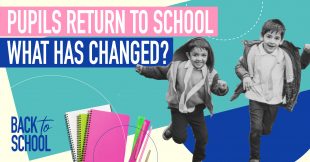
Getting our children and young people back into schools and colleges has always been a top priority – that’s because experts agree the best place for children to be is with their teachers, friends, and peers.
While some things may have changed slightly over the past year, we remain committed to ensuring all children have access to good quality education no matter their background.
Here we provide the lowdown on everything you need to know about the return to the classroom.
Who’s back at school this week?
Since January schools were only open to the most vulnerable children and children of key worker and teaching continued for most via home schooling and remote lessons.
In the first of the Government’s four cautious steps of the roadmap for leaving lockdown, this week marked the return of all children to the classroom.
What is different in classrooms now compared to before the pandemic?
Little has changed regarding the way children are taught at school and all pupils will continue to receive high quality teaching daily.
The main difference is the additional safety measures in place. These include staggered starts and breaks, desks facing forwards, additional hygiene, and ventilation.
Children in secondary schools will also now wear face coverings unless they are exempt or where it could hinder learning, such as for deaf pupils.
In addition, every secondary school pupil will have three tests in the first two weeks, then staff and pupils will do regular weekly testing.
My child goes to primary school, will they be asked to wear a mask?
No, our guidance is clear that children in primary school do not need to wear a face covering.
Face coverings are only necessary for pupils and staff in settings where there are pupils in year 7 and above.
Dr Susan Hopkins and Public Health England officials have strongly advised against primary-age children wearing face coverings as they have difficulties wearing them and keeping them on all day.
What is the process with the testing you have mentioned?
Pupils, teachers and their families should all be tested twice each week.
For pupils, the first three tests will be done on site at schools and colleges under supervision. These will be lateral flow tests which provide a result in approximately 30 minutes. After that, pupils will be given lateral flow device (LFD) testing kits by their school or college to take home.
Upon returning to school or college, teaching and non-teaching staff should take twice-weekly tests using a home test kit provided by their school or college. This includes permanent, temporary and voluntary staff.
If you’re a member of a household, childcare bubble of a pupil, student or staff of a school or college, you can get a twice-weekly test:
- through your employer if they offer testing to employees
- at a local test site
- by collecting a home test kit from a test site
- by ordering a home test kit online.
You can read in more detail about testing here.
Who is being asked to take tests?
Teachers and school staff, secondary school pupils and college students, and the “households” of pupils in school and college – this includes family members, childcare and people in support bubbles.
Primary school pupils are not currently being asked to take tests.
What is being done to help children catch up on lost learning?
Getting children back to school is only the start of our plan. We cannot pretend that the last year hasn’t happened, nor can we pretend there won’t still be effects as we move through the next weeks and months.
That’s why we’re spending £700 million to help children catch up, including one-to-one tuition and summer schools to boost learning. That’s on top of the £1billion we announced last June for tutoring programmes.
In addition, we also know that additional measures were required to ensure students that have been affected by the pandemic were not disadvantaged. This is the reason we have cancelled exams and are putting our trust in teachers, who know their students best.